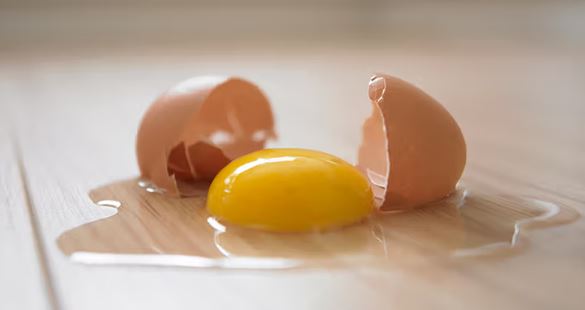Lifestyle
21 incredible things about eggs you must know

Eggs are one of the true kitchen superstars! Whether you like to have them for breakfast, use them in baking, or snack on them during the day, they carry a powerful punch of protein and nutrition.
But there’s more to eggs than their delicious taste and versatility. While many of us love them, there are some fascinating facts about eggs that you may not know.
Let’s crack open the world of eggs and explore what makes them such a beloved ingredient. Here are 21 incredible things about eggs you must know:
1. White stringy substance indicates a fresh egg
The white stringy structures known as chalazae found in egg yolks indicate freshness. These twisted membranes help anchor the yolk within the shell. The presence of chalazae in an egg is a positive indicator of freshness, with thicker, more prominent fibres signifying a higher quality egg.
2. Egg yolk and white have equal protein
One surprising fact about eggs is that both the yolk and the white contain approximately 3 grams of protein each. Traditionally, egg whites are seen as the primary source of protein due to their lower calorie count—60 calories in a yolk compared to just 15 in an egg white. However, egg yolks are packed with essential micronutrients that contribute to overall health, making them a valuable part of your diet.
3. Yolk colour is nutritional indicator
Unlike shell colour, the colour of an egg yolk can indicate its nutritional content. Hens that consume a diet rich in pigmented foods produce darker yolks. For instance, free-range hens often have richer-coloured yolks due to their varied diet consisting of insects and grasses. Studies have shown that these darker yolks can contain significantly higher levels of beneficial antioxidants like lutein and beta-carotene.
4. Earlobes predict egg colour
Interestingly, a chicken’s earlobes can reveal what colour eggs it will lay. Generally, hens with white earlobes produce white eggs, while those with red or brown or dark earlobes lay brown eggs.
5. Egg size correlates to hen age
The size of an egg correlates directly with the age of the hen; older hens tend to lay larger eggs. This is an important consideration for consumers who may prefer larger or smaller eggs for cooking and baking.
6. Eggs are good for your eyes
Eggs are beneficial for eye health due to their high content of lutein and zeaxanthin, which help protect against age-related macular degeneration (AMD) and cataracts. Regular consumption of these nutrients has been linked to improved vision and reduced risk of eye diseases.
7. All eggs are hormone-free
A common misconception is that some eggs are hormone-free; however, all eggs are naturally free from hormones. This is because the use of hormones in poultry production has been banned by the FDA since the 1950s. Therefore, consumers can be assured that all chicken eggs are devoid of added hormones.
8. What are blue eggs?
Have you ever encountered a blue chicken egg? The origin of this unique colour stems from a genetic mutation caused by a virus that affected South American chickens over 500 years ago. This mutation led to the production of a pigment called biliverdin, resulting in blue and green eggs.
9. Eggshell thickness is dependent on hen’s age
Contrary to popular belief, the colour of an eggshell does not determine its thickness. Instead, it is influenced by the age of the laying hen. Younger hens produce eggs with harder shells, while older hens lay eggs with thinner shells, regardless of breed or colour.
10. The colour of shell does not indicate nutritional value
The colour of an egg’s shell—whether blue, green, brown, or white—does not affect its nutritional value. These differences are purely genetic. These colours do not impact on its nutritional value. Similar to nutritional value, the breed affects does not affect the taste.
11. You can find out freshness by buoyancy test
To determine how fresh an egg is, you can perform a simple buoyancy test. Place the egg in a cup of water: if it floats, it’s likely old due to increased air pockets inside; if it sinks and lies flat on the bottom, it’s fresh and safe to eat.
12. Omega-3 myths
While omega-3-enriched eggs are marketed as healthy choices because of their potential benefits to the heart, the extra cost may not be justified. The USDA doesn’t regulate these claims heavily, so there is no promise that these eggs contain considerably more omega-3s than regular eggs.
13. Brown vs. white eggs: Price vs. Quality
Brown eggs tend to be more expensive than white eggs, although the difference in price has nothing to do with quality or health benefits. It simply costs more to feed larger brown-egg-laying hens.
14. Cholesterol concerns?
Recent studies suggest that dietary cholesterol from eggs has minimal impact on blood cholesterol levels for most individuals. The 2015-2020 Dietary Guidelines even removed previous limits on dietary cholesterol intake, indicating that moderate egg consumption may not pose significant health risks
15. Vitamin D source
Eggs are one of the few dietary sources of vitamin D, which is essential for immune function and overall health. To maximise vitamin D retention during cooking, methods like frying or boiling are preferred over baking.
16. Yolk colour is influenced by the hen’s diet
The color range of yolks-from pale yellow to deep orange-are dependent on the hen’s diet. Hens fed on carotenoid-rich foods produce darker yolks due to pigment absorption during digestion.
17. Eggs can be stored for up to 5 weeks in a refrigerator
To maintain eggs fresh up to five weeks, it is best stored in their original carton in the refrigerator rather than at room temperature. This prevents the growth of bacteria and retains quality by limiting moisture loss.
18. Traditional medicine uses
Eggs have been used in traditional medicine across cultures for their nourishing properties. In Chinese medicine, they are believed to support organ health while Ayurveda views them as vital for enhancing body vitality
19. Natural skin care benefits
Beyond nutrition, egg yolks have been used in skincare routines due to their hydrating properties. Their rich content makes them effective ingredients in homemade facial masks suitable for dry or sensitive skin.
20. The largest egg
The largest chicken egg ever recorded was laid in 1956 and weighed an astonishing 454 grams—much heavier than typical eggs which usually weigh between 50-60 grams.
21. Eco-friendly fertiliser
Crushed eggshells serve as excellent natural fertilisers due to their high calcium content, promoting plant growth while reducing kitchen waste, a sustainable practice for gardeners.
Eggs are more than just a breakfast staple, they hold numerous benefits worth exploring. From their incredible versatility in the kitchen to their impressive nutritional profile, there’s so much to appreciate about these little wonders. Whether you’re whipping up a fluffy omelette or baking a delicious cake, eggs bring joy and nourishment to our plates. So next time you crack one open, remember all the amazing things that make eggs truly special!










